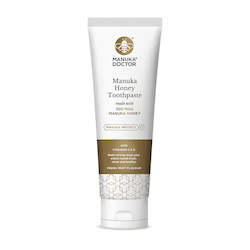Manuka Honey Toothpaste

Health & Wellbeing Awards 2022 - SHORTLISTED - Oral Care
These awards celebrate the very best of health, beauty, food and fitness brands with an expert panel of judges.
made with 300 MGO Manuka Honey and Vitamins C & E.
Contains: 100ml Description
made with high strength 300 MGO Manuka Honey from New Zealand, plus Vitamins C & E.
Harnessing the power of fresh mint flavour to keep your entire mouth fresh, clean and healthy.
Maximum fluoride â fluoride is a safe naturally occurring mineral that is proven to be the most effective way of protecting teeth from decay.
Fresh Mint Flavour - to keep breath fresh.
SLS Free.
Why it works
Manuka Honey
"As well as its antibacterial properties, likely caused by active ingredient Methylglyoxal, Manuka honey also has properties which make it beneficial in maintaining oral health
Studies in the Swiss Dental Journal and Oral Health have shown manuka honey, with its high antibacterial activity, both attacks and inhibits the growth of harmful oral bacteria like P. gingivalis and A. actinomycetemcomitans associated with plaque formation, gum inflammation and gingivitis and tooth decay.
One study examined the effects of chewing or sucking on a manuka honey chew three times a day for 10 minutes following meals on the reduction of plaque and gingivitis. The honey-chew group showed a significant reduction in plaque and gingival bleeding, compared to those who chewed the sugar-free gum.
Although the idea of consuming honey for good oral health may seem counterintuitive, unlike sweets and other refined sugars, manuka honeyâs potent antibacterial effects make it unlikely to contribute to cavities or tooth decay." Pharmacist Gemma Fromage
Vitamin C
A recent study published in BMC Microbiology has shown that vitamin C can play a vital role in preventing the development of dental caries or in other words, tooth decay 1. Vitamin C also contributes to collagen synthesis, which is important for providing tooth structure, support, and maintenance 2,3. There is scientific evidence linking periodontal disease and vitamin C deficiency 4,5.
Periodontal disease affects the tissues that surround your teeth: your gum tissue, or gingiva, the ligaments that hold your teeth in place, or the bone that surrounds and stabilizes each tooth root. The disease might develop due to poor oral hygiene, exposure to environmental toxins or as a side effect of an underlying disorder.
Clinical studies have also found that vitamin C depletion can cause gingival bleeding regardless of oral hygiene 6. Vitamin C reduces the inflammation reaction in periodontal disease, and the administration of vitamin C supplements has been shown to improve periodontal conditions 7. The periodontal healing activity is attributed to the antioxidant activity of vitamin C, and its role in collagen biosynthesis that facilitates wound healing 7. A vitamin C deficiency can result in scurvy which commonly manifests with bleeding gums and increased tooth mobility due to weakened collagen 8.
Vitamin E
Vitamin E, an essential nutrient in your diet, might prove beneficial in helping to control the development or progression of periodontal disease through its ability to prevent inflammation. Chronic inflammation plays an important role in some cases of periodontal disease. Over time, gingival inflammation causes a recession of gum tissue, and promotes the formation of ulcers, while inflammation of the ligaments or bone leads to tooth loosening or loss. Vitamin E can help to reduce the levels of inflammation in your body, potentially helping to control the chronic inflammation that can occur in periodontal disease.
Vitamin E
